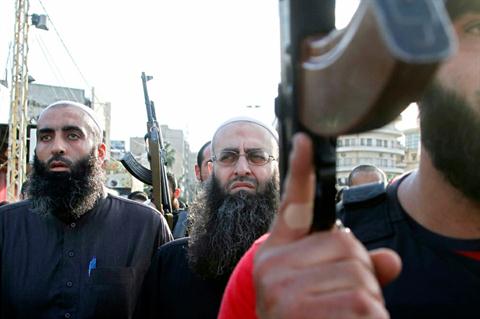
Can the Lebanese Military Ensure Domestic Security After the Battle at Abra?
Publication: Terrorism Monitor Volume: 11 Issue: 15
By:

The Lebanese Armed Forces’ recent battle against the Salafist Free Resistance Brigades in the Abra district of the southern coastal city of Sidon has increased scrutiny of the military’s ability to maintain stability in Lebanon in the context of heightened political and sectarian tensions caused by the conflict in neighboring Syria (see Terrorism Monitor, July 12). Disputes over how best to support the armed Syrian opposition within the Lebanese militant Salafist community—of which Free Resistance Brigades leader Shaykh Ahmad al-Assir is a prominent member—are leading to renewed calls for jihad against the Assad government, its military partner Hezbollah and, among the most extreme Lebanese militant Salafists, against the Lebanese state and military (see Terrorism Monitor, March 8; May 17).
The conflict at Abra was the second high-profile clash between the Lebanese military and Salafist militants this year, with the first occurring on February 2 in the Sunni majority, pro-Syrian opposition border town of Arsal (see Militant Leadership Monitor Brief, February 27).
The Lebanese military’s 2013 budget allocation of $1.2 billion is inadequate to fund the wide range of roles that the Lebanese Armed Forces (LAF) have been asked to assume (al-Akhbar [Beirut], July 10). Providing the Lebanese military with advanced weapons to confront regional opponents, such as Israel, and to fulfill its political mandate to confront internal challenges, including that posed by sectarian militias incensed by the conflict in Syria, has been supported by all of Lebanon’s major political actors since the start of the Syrian civil war (Daily Star [Beirut], August 1, 2012). Lebanese politicians from both the nominally anti-Assad March 14 political bloc and the nominally pro-Assad March 8 political bloc reiterated their support for the Lebanese military after the fighting in Arsal and Abra and sectarian clashes in Tripoli (al-Nahar [Beirut], July 8). The Lebanese military reacted to Abra with an unusually direct condemnation of groups “determined to stoke sectarian tensions against the backdrop of the political divisions in Lebanon over military developments in Syria” (AFP, July 7).
The Lebanese military’s statement followed the fighting at Abra and Shaykh al-Assir’s call for Sunni Lebanese soldiers to defect and join a Lebanese Sunni rebellion. [1] Sunnis are believed to constitute a majority of the military (Executive Magazine [Beirut], August 3, 2010). Shaykh al-Assir’s rhetoric deliberately echoes the Syrian civil war, where a larger number of Sunni Syrian soldiers turned their weapons against the Assad government. His exhortation is one of the most public expressions of a Lebanese militant Salafist narrative that all Lebanese government institutions are kuffar (infidel) in origin, even those such as the military that provide much-needed income and career prospects for youth from economically depressed Sunni communities.
The LAF’s confrontation with Shaykh al-Assir’s Free Resistance Brigades at Abra was noteworthy for the military’s alleged collaboration with local militiamen sympathetic to Hezbollah and its reported torture of a member of al-Assir’s group that it held in detention (see Terrorism Monitor, July 12). Responding to the March 14 bloc’s criticism of the LAF, President Suleiman defended the military’s role in Lebanon, reproaching March 14 politicians for exaggerating claims that the military was sympathetic to Hezbollah and issuing a call for armed groups, including Hezbollah, to remove themselves from Sidon (as-Safir [Beirut], July 8). The combat at Abra demonstrated that while the LAF has the capability of acting decisively against the challenges posed by armed militias, it was still forced to overcome severe institutional and operational limitations, even against a far weaker opponent like the Free Resistance Brigades.
Lebanese military intelligence, under the authority of the Ministry of Defense, is weakened by diminished resources and persistent institutional antagonism with the Ministry of the Interior’s information branch. Due to its need for better intelligence gathering and operational reconnaissance, the Lebanese military is in many circumstances forced to rely upon local informants for reconnaissance and intelligence gathering, including members of local militias or antagonistic political parties. This type of local engagement opens the Lebanese military up to criticism for being a biased actor in Lebanon’s political and sectarian feuds. [2]
The fighting in Sidon, linked closely to the escalating impact of the Syrian conflict on certain segments of Lebanon’s population, appears to have increased the urgency of support to the Lebanese military provided by anti-Assad Western countries. Moved to renew their pledge of support for the Lebanese armed forces, the governments of the United States, the UK and France are seeking to increase the capacity of the Lebanese military to police its borders and fight internal antagonists through continued support for training programs and accelerated sales of military hardware (al-Nahar [Beirut], June 28; Daily Star [Beirut], July 17; July 18).
Of these nations, the United States has paid special attention to building the capacity of the Lebanese military, particularly in providing training for urban combat and special operations, including counter-terrorism. [3] The U.S. Army and Marine Corps trainers have worked with Lebanese soldiers to improve their marksmanship skills and urban combat techniques in U.S.-based training courses. [4] Improving urban warfare skills at the company and regiment level and the establishment of advanced command-and-control technology to direct large-scale operations, are pressing needs for the Lebanese military. [5]
Lebanon’s military is limited in its effectiveness by the conflicts and disagreements between the country’s political blocs and this state of affairs is unlikely to be reversed without the formation of a new Cabinet and the development of a cohesive national strategy on how to respond to the Syrian conflict, including the growing presence of Syrian refugees in Lebanon. At the present time, the Lebanese military is an organization that has the capacity to act in limited operations within the country but will need increased funding from the Lebanese government and foreign sources, more robust training partnerships with foreign militaries and a stronger political mandate to operate forcefully within the country when evidence is provided that such action is necessary.
Nicholas A. Heras is an independent analyst and consultant on Middle East issues and a former David L. Boren Fellow.
Notes
1. “Ahmad al-Assir Calls Everyone to the Roads to Jihad against the Lebanese Army and to Schism with It,” June 23, 2013, https://www.youtube.com/watch?v=Aq2NClmKIuc.
2. Information in this paragraph is based on interviews conducted by the author with a Lebanese army source with extensive operational experience throughout Lebanon who requested anonymity due to being on active duty. Interviews conducted on June 30 and July 10, 2013.
3. Michael Foote, “Operationalizing Strategic Policy in Lebanon,” Special Warfare 25(2), April-June, 2012, pp. 31-36.
4. Michael Stevens, “FAST Marines Train with Lebanese Armed Forces,” United States Central Command, April 30, 2010, https://www.centcom.mil/news/fast-marines-train-with-lebanese-armed-forces; “Guard Scouts Teach Tactics to Lebanese Counterparts.” Georgia National Guard. June 30, 2011, https://gadod.net/index.php/news/ga-dod/archives/445-guard-scouts-teach-tactics-to-lebanese-counterparts; Teresa Coble, “U.S. Army Special Forces Soldiers Graduate Qualification Training,” March 13, 2012, https://www.army.mil/article/75618/.
5. Information based on interviews conducted by the author with a Lebanese army source with extensive operational experience throughout Lebanon who requested anonymity due to being on active duty. Interviews conducted on June 30 and July 10, 2013.





